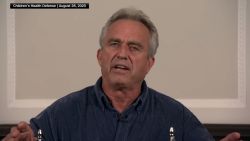Top Senate Republicans look at the prospects of a Donald Trump primary victory with trepidation, fearful his polarizing style and heavy baggage may sink GOP candidates down the ticket as their party battles for control of the chamber.
But Sen. Steve Daines doesn’t agree.
The Montana Republican, who chairs the National Republican Senatorial Committee, has spent the past year working to ensure Trump and Senate Republican leaders don’t clash about their preferred candidates in key primaries, after the 2022 debacle that saw a bevy of Trump-backed choices collapse in the heat of the general election and cost their party the Senate majority. So far, the two are on the same page.
Daines argues that Trump is “strengthening” among independent voters and that could be a boon for his Senate candidates – even in purple states like Michigan, Wisconsin, Nevada and Pennsylvania. The senator says that his down-ticket candidates should embrace the former president, even as he’s facing four criminal trials with polls showing that he remains a deeply unpopular figure with wide swaths of voters.
“What’s key is we want to make sure we have high-quality candidates running with President Trump,” Daines said. “Candidates that can again appeal beyond the Republican base – that’s my goal.”
In an interview with CNN at NRSC headquarters, Daines detailed his latest thinking about the GOP strategy to take back the Senate, saying his candidates need to have a stronger position on abortion, signaling he’s eager to avoid a primary in the Montana race and arguing that neither Sens. Kyrsten Sinema nor Joe Manchin could hold onto their seats if they ran for reelection in their states as independents.
And as Kari Lake is poised to announce a Senate bid in Arizona as soon as next week, Daines has some advice for the former TV broadcaster, who falsely blamed mass voting fraud for her loss in last year’s gubernatorial race in her state.
“I think one thing we’ve learned from 2022 is voters do not want to hear about grievances from the past,” Daines said. “They want to hear about what you’re going to do for the future. And if our candidates stay on that message of looking down the highway versus the rearview mirror, I think they’ll be a lot more successful particularly in their appeal to independent voters, which usually decide elections.”
Daines, who called Lake “very gifted” and said he’s had “positive” conversations with her, added: “I think it’s just going to be important for her to look to the future and not so much the past.”
Asked if Trump’s repeated false claims of a “stolen” election could be problematic down-ticket, Daines instead pointed out that Trump was the last GOP president since Ronald Reagan to win Wisconsin, Pennsylvania and Michigan in 2016, though he lost those states in 2020.
“As we continue to watch the president strengthen, we’ll see what happens here in ’24, but I’ll tell you he provides a lot of strength for us down ballot in many key states,” said Daines, who was the first member of Senate GOP leadership to endorse Trump.
Daines’ assessment comes as he is benefitting from a highly favorable map, with 23 Democrats up for reelection, compared to just 11 for the GOP. Democratic incumbents in three states that Trump won – Ohio, Montana and West Virginia – are the most endangered, while the two best Democratic pickup opportunities – Texas and Florida – remain an uphill battle.
“We’ll have to keep an eye on Texas – the Ted Cruz race,” Daines said. “Just because he’s Ted Cruz he’ll draw a lot of money from the other side to try to defeat Ted Cruz.”
Beating incumbents is usually a complicated endeavor, plus Republicans are facing messy primaries that could make it harder to win a general election, including in Daines’ home-state of Montana. There, Daines has gotten behind Tim Sheehy, a former Navy SEAL who owns an aerial firefighting company. But there’s a possibility that Sheehy could face Rep. Matt Rosendale in the primary, something that Republicans fear could undercut their effort to take down 17-year incumbent Sen. Jon Tester.
Rosendale, a member of the hard-right House Freedom Caucus, narrowly lost to Tester in 2018 and is considering another run in 2024.
“I’ve known Matt a long time. He’s a friend of mine. I like Matt Rosendale,” Daines said. “I think it’s best if he were to stay in the US House and gain seniority.”
Unlike in the last cycle when the NRSC stayed neutral under previous leadership, the campaign committee now is taking a much heavier hand in primaries, picking and choosing which candidates to endorse. While Daines declined to say how his committee would handle the Arizona primary, he indicated they would stay out of the crowded Ohio primary, arguing the three GOP candidates battling it out there are on solid footing in the race for Sen. Sherrod Brown’s seat.
While West Virginia remains perhaps the best pickup opportunity for the GOP, the NRSC will have a much harder time if Manchin decides to run for reelection. In an interview, Manchin signaled that if he runs again, it may be as an independent – not a Democrat.
“I think everyone thinks of me as an independent back home,” Manchin told CNN. “I don’t think they look at me as a big D or a big R or an anti-R or anti-D or anything. They say it’s Joe, if it makes sense, he’ll do it.”
Daines said that wouldn’t make much of a difference.
“It’d be very difficult for Joe to get reelected in West Virginia based on looking at the numbers,” Daines said, pointing to Manchin’s support for the Inflation Reduction Act.
Similarly, Daines said that if Sinema runs in Arizona, he doesn’t believe she can win as a third-party candidate, as she faces a GOP candidate and the likely Democratic nominee, Rep. Ruben Gallego.
“I think Sinema will have a difficult path if she gets in the race,” he said.
In addition to facing weaker candidates last cycle, many Republicans continue to sidestep questions on their positions over abortion – a potent issue in the aftermath of the Supreme Court’s ruling overturning Roe v. Wade.
But Daines says he doesn’t think abortion will be “as potent this cycle,” indicating he is pressing candidates to do a “better job” messaging on the issue to suburban women. He said that Republicans need to impress upon voters that they support limits on late-term abortions, with exceptions for rape, incest or life of the mother, arguing that’s a “more reasonable position” in line with most Americans – all the while rejecting calls for a national ban on all abortions.
“I think we actually had candidates who just kind of ran away from the issue and kind of hoped it went away,” Daines said. “And when you do that, if you don’t take a position, the Democratic opponents there will define the issue for them. And that’s a losing strategy.”
Daines is also in the middle of another internal party war – between Trump and Senate GOP Leader Mitch McConnell, as the two men have been at sharp odds since the January 6, 2021, attack on the Capitol.
Asked if he believed the two could work with each other if Trump is president again and McConnell returns as Republican leader, Daines said: “It’d be a privilege to have a Republican president and a Republican majority leader working – that’d be a nice problem to have.”
CNN’s Sam Fossum contributed to this report.





















